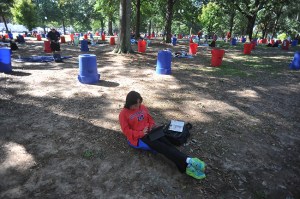Mississippi nurses receive SANE training to assist sexual assault victims
Published 11:01 am Wednesday, December 6, 2017
By Haley Myatt
EAGLE Contributor
Shalotta Sharp’s efforts are changing Mississippi.
Trending
Sharp is a Sexual Assault Nurse Examiner, also known as a SANE nurse. The specialized training is long and extensive but provides a much-needed service within the state. SANE training includes a 40-hour course which gives a RN the required education to provide expert care to a patient that states they have been sexually assaulted.
Thanks to Sharp’s efforts in training nurses the past seven years, there are currently six SANE trained professionals on staff at the UM Health Center, which is the most Ole Miss has ever had.
Up until the course began on Nov. 13 to 17, there were no known SANE nurses on the Baptist Memorial Hospital-North Mississippi ER staff until one (RN nurse), Erin Jackson, volunteered to take the course.
“I just want to make sure that I can be a resource for a victim and feel comfortable with what I’m doing from the rape kit all the way down to being proficient with the legal aspects,” Jackson said. “Once you get the procedure down pat, you can give more of yourself emotionally. I want to be there for them emotionally.”
Sharp says in high hopes that she has not given up on reaching more nurses from the Baptist Hospital and plans to do another SANE training in Oxford in the future.
During SANE training, Sharp, who is the Special Projects Coordinator of Mississippi Coalition Against Sexual Assault (MSCASA), taught the nurses a standard model of care for sexual assault victims. MSCASA initiated the SANE Course in 1999. Sharp is the second certified SANE in MS (SANE-A) and the first dual certified (SANE-A, SANE-P) in Mississippi, and is still the only dual-certified SANE pediatric (SANE-P) in the state.
Trending
“It is scientifically proven SANE nurses are more effective at handling sexual assault cases,” Sharp said. “Hospitals that do have SANE nurses are better nurses overall.”
MSCASA is the only course that provides nurses with training and has been available in Mississippi for the past seventeen years.
Doctor Travis W. Yates, Director of the University Health Services, stated his agreement with Sharp on how crucial SANE nurses are to the wellbeing of patients after a traumatic experience like sexual assault.
“No health clinic or hospital is required to have a SANE nurse, but it looks good to be certified,” Yates said. “There is no requirement for anyone to have a SANE nurse on other campuses or in other hospitals. We are fortunate to have the staff we do.”
The health clinic is open Monday through Friday from 8 to 5 p.m., so when someone is assaulted after hours, what is the protocol?
Yates and Sharp both stated that victims are directed to the ER where doctors can perform a rape kit, despite being SANE specialized or not. The only time that the ER sends patients away to Tupelo or Batesville is if the patient needs higher medical attention.
Yates states that as a doctor, he would argue that a 40-hour course does not trump three years of residency training, but Sharp points out that while any doctor or nurse can do it, nothing is as efficient as having a SANE nurse.
Based off of her 12 years of experience, Sharp she has seen forensic exam encounters takes anywhere from 2 to 4 hours to be done correctly.
“Doctors are responsible for every single person in the ER and do not have the time to be tied up, one-on-one with a sexual assault victim and maintain that chain of custody and stay with their evidence for that amount of time,” Sharp said. “It is not cost effective at all and throws them into a liability because they aren’t tending to the other patients.”
According to the National Alliance to End Sexual Assault, crime victimization costs the United States $450 billion annually.
The training has been very successful since it frees the attending physician, provides a nurse with expertise, and moves patients through the ED in a more efficient way according to Yates and Sharp. Plus, in cases that go to court, a nurse can testify in place of a physician since they are trained to do so.
SANE nurses are often the first faces a patient sees, making sensitivity a priority.
“These nurses understand trauma and they understand trauma responses, so when survivors are presenting and responding in many different ways, they understand where that’s coming from,” Sharp said. “They let them know exactly what is going to happen while they’re collecting the kit and they let them know they have a choice over all of it.”
Financial Issues
So why aren’t there more sexual assault nurses? Yates and Sharp both state that there are too many dynamics that play into it.
Yates said one issue is financial. While there is no charge for nurses to take the course since it is state-sponsored, the health center has to cover their travel expenses as well as expenses for substitute nursing coverage during their absence.
“The reason it is extremely important and why I want our SANE nurses trained is every nurse is extremely complimentary and proud they went when they come back to work,” Yates said. “I can’t speak for the hospital, but you realize they have the same problems I would have. The ER would struggle with staffing if they had a nurse out for an entire week, it is a staffing and a financial issue for them I’m sure.”
Sharp says that the lack of SANE-trained nurses is not only a local problem but is a state, national and international problem.
“The reason hospitals lack SANEs is because if the course is not in their town, they have to send their nurse to wherever it is and nurses want to get reimbursed and hospitals may not have the staffing or money to send them,” Sharp said. “MSCASA offers a scholarship now, so if a hospital says they don’t have the resources, we can pay a nurse’s salary for their travels and education.”
Yates said he also thinks that nurses just don’t have time to take a week off and that might be why there is a lack of them.
“This is all a positive thing and support for sexual assault victims are on the up no doubt,” Yates said. “I think as time goes on, you will have sexual assault training integrated into nursing training. Who knows, maybe ten years or so from now, it will be required for nurses to have more training in handling trauma than they currently do. Which I think would be great.”
In practice, though, SANEs can be few and far between, especially in rural areas. Mississippi does not have any legislation that says hospitals need to have a SANE nurse. There is a senator from Texas who is pushing for legislation to have a sexual assault nurse at every hospital.
“In my personal opinion, I believe that every hospital should have a SANE to encounter a sexual assault patient,” Sharp said. “I think every hospital needs a nurse who can ask the right questions and point to the best resources. Nurses with this education are more comfortable in this role.”
Need for education
Tracy Summers and Drenette Burchfield, two nurses who attended the training from the health clinic said that they think most nurses and people are just uninformed about what a SANE nurse is.
“Forensic nursing is a fairly new aspect of nursing and it has only been called this for 15 to 20 years now,” Burchfield said. “So it is a fairly new concept to train nurses. The big push is to educate our population. SANE falls under forensic nursing.”
Jackson stated that she heard four more nurses from the Oxford hospital will undergo a smaller four-hour training, titled “Emergency Department Care of the Sexual Assault Patient,” in December.
Sharp says that this four-hour class is a brief overview of the patient presentation and a demonstration of the evidence collection process.
“It is content from the SANE Course, but does not meet all the education requirements as the SANE Course,” Sharp said. “So the nurse that takes this class is not a SANE, but can do a better, more efficient job of evidence collection and basic medical care.”
Summers and Burchfield both stated that there has been much more dialogue lately about if it should be a requirement to have a SANE nurse at least on call at all times. This could be due to the fact that five sexual assaults have been reported at Ole Miss this fall semester alone.
Empowerment
It could also be that people are feeling more empowered now than ever to report based off the new coverage from cases like Bill Cosby, Harvey Weinstein, John Besh and the recent news about Matt Lauer and Charlie Rose. Congress returned from the Thanksgiving break to end secrecy over sexual harassment.
Sharp and Jackson both said it is a wonder any victim ever comes forward.
“First of all look at how we treat rape victims in the media and society. When the Bill Cosby news broke and the first victim came forward she was automatically called an alleged victim, he was never an alleged perpetrator, so we automatically use terminology that suggests we don’t believe the victim,” Sharp said. “If you look back through history we have always treated sexual assault victims this way, there has never been a time in our culture where we automatically believed them. We have always downplayed them.”
Until we change that culture, this is going to be the norm.
Any RN can attend the SANE Course, but to become certified, the RN has to have practiced for 2 years and meet competency hours as required. If they pass the test and do their hours they can be designated as SANE-A certified.
Sharp says that unlike other registered nurses who have not undergone SANE training, SANE nurses are more qualified and are better able to understand the patient history and dynamics.
“Our forensic nurses have a lot more training and education regarding sexual assault patient population,” Sharp said. “SANE nurses will have more expertise in the patient presentation along with understanding the physiological trauma.”
Sharp said being a SANE completely changed her worldview. She said she learned how to read and comprehend research and become a better nurse with this education and looked at all patients with more compassion and better critical thinking skills.
“Through this education, I was able to learn how violence impacts a person throughout the lifespan,” Sharp said. “I also learned about the strength and courage it takes for a victim of violence to survive and sometimes, not always, go public.”
Life-changing tragedy
Calvin Bennett, RN and Director of Residence Life & Housing at Meridian Community College said that his experience with SANE training as been eye-opening and he has learned a lot of information that he can’t wait to take back with him to his students.
“I think all nurses should undergo this training because whether you are in the ER or on a college campus you never know where you will have a situation like this and this will let you make them feel better to get through their situation,” Bennett said.
Like Bennett Summers and Burchfield said that they are taking this knowledge back to assist students at Ole Miss. Summers thinks that it would even be beneficial if the students took some form of this course to learn more about sexual assault.
“I have learned so much, courses like these are great because they will sharpen your current knowledge and teach you techniques you didn’t already know,” Jackson said. “I hope I can go back and promote this training at the hospital.”
All the nurses in training agreed learning about the neurobiology of trauma was something they didn’t know before.
“In my opinion, it is probably the most important research that’s come out because we have concrete evidence of what trauma does to a victim, including sexual assault victims,” Sharp said. “In this research scientists looked at the brains and looked at hormone levels of all victims of trauma including sexual assault and found that the brain interprets sexual assault as any other type of trauma.”
One concern most of the nurses had that Sharp says she constantly hears is that nurses don’t want to testify in court. To conquer that fear, a mock trial demonstrated with nurses as expert witnesses, real prosecutors and judges in a real courtroom setting were included in the training.
The training, which was in correlation with Forensic nurse week, also included a live model skills lab, where volunteers let the nurses practice pelvic exams for rape kit procedures.
Kim Hodges, a SANE nurse, has volunteered as a live model for seven years and enjoys contributing to the learning process for nurses.
“There’s no way they cover this whole SANE course in nursing school,” Hodges said. “Pelvic exams on live models are not part of nursing school.”
“You have to know normal to know the difference between normal and abnormal during an exam,” Hodges said. “The first time you do a pelvic exam, it should not be on a victim, so this gives them a chance to learn hands-on before they do the real deal.”
Sharp says MSCASA provides training not only to nurses but to law enforcement officers and work with rape crisis centers on how to encounter patients.
“Anybody who would encounter a victim of violence, we educate,” Sharp said. “If you are a detective and get a call and your mind goes blank, I give my cell to let them know let me help you with this.”
Sharp says she loves her role at MSCASA.
“I am passionate about educating anyone,” Sharp said. “I feel that our state is very fortunate to have an organization that supports victims of violence through education and technical assistance to any agency. That is my favorite thing about MSCASA… the passion for victims and passion for helping those that serve this population.”
Baptist Memorial did not respond to a request to be interviewed for this story.






